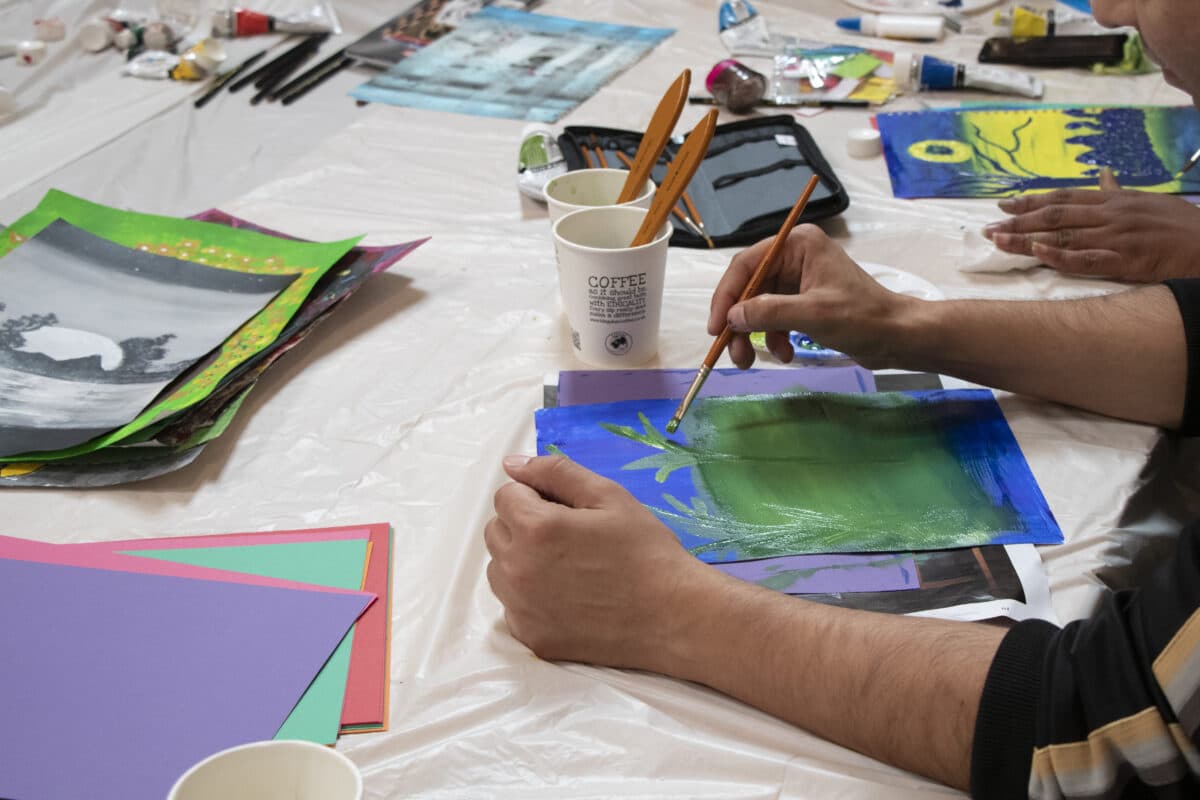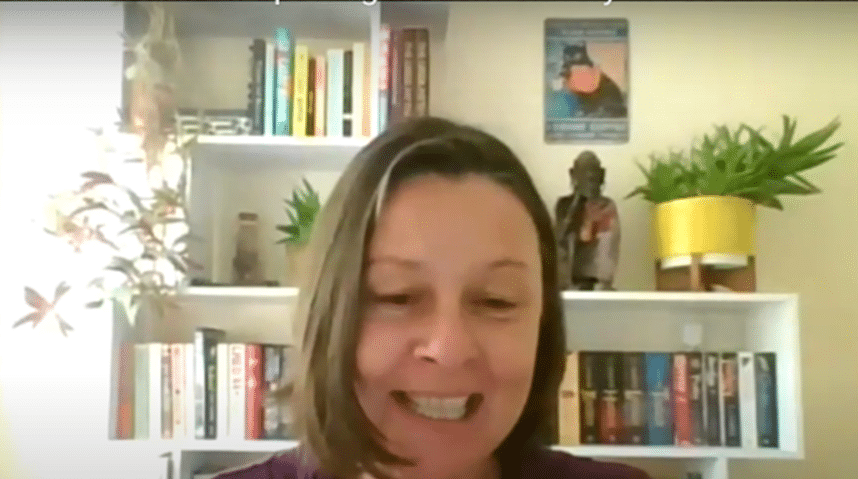Modern Slavery Helpline 08000 121 700
It is estimated that over 100,000 people are living in modern slavery in the UK today.
With almost a third of individuals identified by the Home Office as potential victims of modern slavery in London, modern slavery is a live issue for parishes across the Diocese.
Read on to find out how to spot the signs of modern slavery, and what you can do as a church community to work towards ending modern slavery.
Frequently asked questions about modern slavery
Modern slavery is an umbrella term for all forms of slavery, trafficking and exploitation.
Modern slavery is a serious crime in which people are coerced or deceived into a situation where they are exploited, for the purpose of making a profit. The offence is punishable by up to life imprisonment under the 2015 Modern Slavery Act.
In London there are many forms of modern slavery, including:-
- sexual exploitation (including prostitution, strip clubs, escort work and pornography)
- domestic servitude (including working as cleaners, carers or nannies)
- labour exploitation (in work such as nail bars, car washes or the construction industry)
- criminal exploitation (such as county lines, or forced begging)
There is no typical victim of modern slavery. Victims can be any age, gender, ethnicity or nationality. Victims can often face more than one type of abuse and slavery, for example being sold on to another trafficker and then forced into another form of exploitation.
However there are some common signs of modern slavery and exploitation which we can all be looking out for.
Absolutely! You could display posters in key places in your church/ hall, signposting potential victims to available support and with the Modern Slavery Helpline number (08000 121 700) clearly visible. Two good resources are:
General awareness raising posters from The Clewer Initiative
The Gangmasters and Labour Abuse Authority (GLAA)have leaflets specifically on labour exploitation:
- Know your rights posters (can be downloaded in a number of languages)
- Leaflet- Spotting the signs of labour exploitation
- Workers’ Rights Leaflets – Translations – Languages – GLAA
- Unseen have a leaflet specifically on spotting the signs of county lines Leaflet- County Lines Exploitation
You could display the flowchart below in your church/ church hall, and include it in any volunteer briefings/ trainings, so that people know what action to take if they suspect/ witness, or someone discloses information that may indicate that they are a victim of modern slavery, or exploitation.
Safeguarding Flowchart for reporting modern slavery
You should phone 999 if there is any immediate danger or medical attention is required.
Otherwise, you should report any concerns to your local safeguarding lead and agree who will report to the Diocesan Safeguarding Advisor. The Duty Safeguarding Line contacts are email: safeguarding@london.anglican.org and phone: 020 7932 1224
You would agree with the Diocesan Safeguarding Advisor who to contact as a next step and the numbers for reporting modern slavery are:
- The Police on 101 for advice about local issues and to report suspicions, or 999 if someone is in immediate danger.
- The Modern Slavery Helpline on 0800 0121 700 – to report suspicions or concerns and to ask for advice about modern slavery.
- The Gangmasters and Labour Abuse Authority (GLAA) on 0800 4320 804/ 0115 959 7032 / intelligence@gla.gov.uk – for advice on labour exploitation or to report suspicions.
- Crimestoppers on 0800 555 111.
It might not end up being a situation of modern slavery, but it could be another safeguarding concern (such as neglect), so it is always worth contacting your safeguarding lead for their advice.
There are! Our friends at The Clewer Initiative have a number of Bible readings, hymns, ideas for prayers and a sermon script for inspiration on their website.
The Clewer Initiative have produced three Bible study resources, which could be used with small groups or for individual study during Lent, in the lead up to Anti-Slavery Day (18th October), or at any time of the year:
- True Freedom is a six week course, drawing on themes from the book of Galatians, and designed to encourage individuals and churches to respond to modern slavery in their communities.
- Journeys is a resource based on the “Stations of the Cross” and through short films and devotional resources challenges churches and individuals to take action against modern slavery.
- John’s Seven Letters to the churches. John wrote these letters at a time of great anxiety and uncertainty and you can use these letters as the basis for response in prayer, meditation and action.
You can find here resources for teaching Children and Young People about Modern Slavery including lesson plans and collective worship resources .
There are various options for trainings on modern slavery.
You can contact the Compassionate Communities Team and we can work out together the best fit for your particular trainings needs. Possible options are below, or we can create something bespoke for your context:
- Hidden Voices Course– looks at detection, prevention and action planning
- County Lines – a more in depth look at county lines
- Modern slavery and safeguarding training for social action projects.
Anti- slavery Day is on 18th October each year.
If you are organising an Anti-Slavery Day church service you can find below resources from The Clewer Initiative which may help you in planning the service, including:-
- Bible readings and hymns
- Ideas for prayers
- A sermon script for inspiration
Latest video resources on modern slavery
Ideas for how my church community/ chaplaincy can get involved in the work to end modern slavery
There are many ways church communities and chaplaincies can get involved in the work to end modern slavery in the UK and globally.
Why not commit to 3 actions from the selection below for the year ahead?
There is a one page customisable pledge poster which you could display with the three actions you have committed to take.

- Choosing contractors: If your church community is looking to do some building work or get a tradesperson in, remember to consider the welfare of workers. Choosing the cheapest quote is not always the wisest idea. Cheap might mean workers are being exploited. If your church community employs a cleaning company, you could take time to talk to the cleaners and hear their stories. If you have suspicions that they are not working freely or being paid or treated properly, you can report this to the GLAA.
- Purchasing decisions: There may be Fairtrade alternatives to the products you currently buy. You could search for suppliers who can guarantee that slavery is not present in the supply chain.
- Tapping into the latest research: You could raise your awareness of the key issues faced by victims and survivors of modern slavery. The charity Hestia have a fantastic report series entitled ‘Underground Lives’ focussed on modern slavery in London.
- Running a film night to raise awareness: The Clewer Initiative have a range of videos about different aspects of modern slavery available on their YouTube channel You could run a Women in the Shadows film night to raise awareness of how modern slavery affects women and girls.
- Mapping the risks of modern slavery in your community: You could get a group in your church/ community together to reflect on and map the risks of modern slavery in your local community. Useful questions to reflect on can be: Who is at particular risk of modern slavery? What threats are on your doorstep? Is there a local hand car wash? Are there lots of farms, construction sites, factories, nail bars or a thriving night-time economy nearby? What do you know about county lines in your area? You can also contact the Compassionate Communities Team for support in the process of mapping your community.
- Signposting: You could display posters in key places in your church/ hall signposting potential victims to available support and with the Modern Slavery Helpline number (08000 121 700) clearly visible. There are posters available to download from The Clewer Initiative to raise awareness and ensure the signs of modern slavery are front of mind.
- Using the Safe Car Wash App: The Safe Car Wash App enables anyone who uses hand car washes to identify and report slavery. You could download the Safe Car Wash app and encourage others in your church community to do so.
- Finding out about existing provisions in your community: You could find out about what modern slavery charities exist locally and what is already established in your community that your church could support / get behind. From this you may establish any gaps in provision where you as a church community may be able to meet some of the needs of your community.
- Being a catalyst for connection: If there is nothing already established, you could gather the Police, schools, churches and other community organisations to discuss how you can help end modern slavery in your local community.
- Supporting charities already at work in the Diocese of London: such as Tamar, and find out how you can best support their work.
- Safeguarding our social action projects: Many of the vital projects which our church communities are involved with bring us in contact with some of the most vulnerable people in our communities. Be that our foodbanks, our mother and toddler groups, or our hospitality to migrants and asylum seekers to name but a few. You can make sure that those running and volunteering in these spaces feel equipped to identify signs of exploitation and modern slavery, and know the right steps to take to safeguard and protect an individual if they have concerns. There are various online trainings available online on safeguarding in our social action projects, and you can contact the Compassionate Communities Team to find out the latest available options, or about running something bespoke for your context.
- Raising awareness of the risks of modern slavery in our foodbanks Traffickers sometimes use foodbanks as a way to recruit people, as well as feed victims at no cost to themselves. Displaying these posters in your foodbank can be a means of raising awareness amongst foodbank users, as well as staff and volunteers, about how to spot the signs of modern slavery and what you can do. You can download the two versions of the poster, poster for foodbank users and poster for foodbank staff and volunteers.
- Hosting a survivor of modern slavery through Hope at Home. If you live in London or the South and would like to find out about sharing your spare room with a survivor of slavery facing homelessness you can email Hope at Home or visit their website for further details.
- Hosting a ‘hub’ space in your church: This is a space where survivors of modern slavery can meet together and share an activity. You can read the story of one church who hosted a space for survivors of modern slavery to create art here. You can contact the Compassionate Communities Team to find out more or be connected with another London church community who have hosted such a space.

